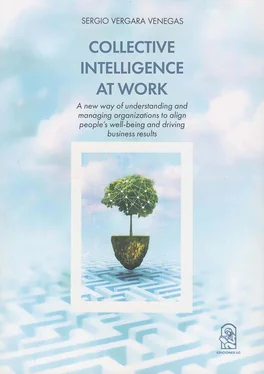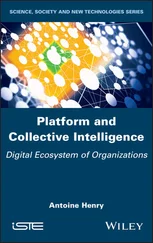As you will see in the book, learning to manage the organizational climate is a process that implies that all those involved learn to achieve openness, build trust, develop the capacity to discuss difficult issues with respect, and express a difference of opinion without becoming enemies. If we can learn to do this, to better develop the “muscle” of a mature dialogue, why can’t we try to bring this learning into the social debate?
The author hopes that this will contribute to the development of a strategic issue for the evolution of organizations, which, when transformed, change society, its dynamics and the people who live in it.
SERGIO VERGARA VENEGAS
November 2014

CHAPTER 1
COLLECTIVE INTELLIGENCE
Can We Learn to Be Collectively Smarter?
What capacity do our organizations and teams have to generate learning and progress? How much do we fall into mutual discrediting or mistrust before we enter into joint reasoning about the challenges we face?
People with different understandings will act in different ways, causing “unintelligence.”
As pointed out in the introduction, creating collective intelligence implies helping all those involved to acquire skills that generate synergy when displayed together. We will delve into these variables:
1. Shared understanding. Not all problems can be solved by knowing the answer. There are many adaptive challenges that require the solution to be built jointly by those involved, who learn in the process. This is the case with organizational climate, democracy, job security, relationships and many others. In these cases, even if it is a matter of implementing a change proposed by a specialist or expert, those who have to make the change will have to learn to do it by themselves. As in many challenges, there are several parties involved, so it becomes crucial to have a shared understanding of the problem being facing. Often, we find that the views on the problem are very different from one group to another, or from one hierarchical level to another. This creates a Tower of Babel. Each group will come up with a different plan on how to solve the problem, because they start from different understandings.
Getting everyone “on the same page” is more complex than just talking about the issue. It often involves learning to speak a “new language.” A typical example is a problem analysis meeting between members of a project team:
John (Technical Project Manager): “We have a serious problem with the way we are approaching this project. Failure to involve the grassroots in time will cost us dearly, as the solutions are impractical.”
Peter (Project Manager): “But whose responsibility is it to include the grassroots in this issue? It’s the managers! It’s up to us! We are the ones who have to involve everyone and we have to communicate better with them!”.
John: “We’ve already tried, but it doesn’t work. They are constantly waiting for an answer from us, rather than all of us thinking together.”
In this interaction we see that John and Peter speak in different “languages.” John refers to what is happening and Peter to what needs to be done, and these are two different conversations. One is focused on what is happening and can lead to a better understanding of the problem if the dialogue is well conducted, or to a complaint or resignation if the dialogue is poorly conducted. The other is about Peter trying to stop John from complaining or resigning, if the conversation is well conducted, or it can be about trying to solve the problem without understanding the causes, which can lead to simplification and minimization when the course of the conversation is not properly conducted.
One of the problems that groups face is that they fail to discuss and generate shared understanding of issues or challenges because they mix things without realizing it, from talking about what is happening to what should happen.
At other times, the skills required to build the solution have not been available in the history of those involved. In the book Invisible Loyalties, Boszormenyi-Nagy and Spark point out that it is very difficult to ask a parent who had a distant upbringing to be close and warm with their own children (1973). This is a “language” they “didn’t learn” in their childhood. It does not mean that they cannot learn it in the future, but it will probably not be easy, because they do not have role models from their past, people from whom to have acquired those skills or at least to have observed said abilities in others. We can see the same thing in organizations when people who were trained by a managerial leadership model are asked to change. They may be willing and able to learn to be different, but not without difficulty, because the models they have had in the past, and often in the present, do not speak the “language” they need to learn (if their own management maintains the same hierarchical models).
It is common in the technical world to use the phrase “we have not been able to...” as a way of showing the capacity to manage and solve problems. However, in the adaptive world and in collective learning, we think this phrase is not fair. It is more correct to say “we have not figured out how to...” so far. It is not fair to ask a group that does not know how to talk to authority figures, because they have never had the space to do so, to suddenly become proactive and constructive.
2. Role maturity. It is very important for each individual to know the role they play in relation to others. Therefore, it is always useful to define them and associate them to the processes they are part of. However, knowing one’s role is not equivalent to knowing how to perform it, nor to acquiring the skills to perform it well, not only as an individual, but as a system, i.e. to perform the role in conjunction with the other roles. This is a process. Being appointed team leader or manager for the first time does not mean that we immediately have the maturity to exercise authority, but it will be the result of experience and often of learning from mistakes. In the case of collective intelligence, it is more complex, because we are considering not only that individuals learn to exercise their role, but that they learn simultaneously and in relation to others. As if it were a group learning a new dance, but collectively. This implies that the mistakes that are made do not only affect the one who makes them, but everyone, feeding back mutually. Thus, for example, it would be a great challenge for an authoritarian leader to lead a group of people who have always been afraid of authority to learn to talk openly about the organizational climate or safety. This is because the team leader would find it difficult to listen without giving instructions or punishing, while the team would not dare to express what is really happening or what they feel, which would encourage the leader to stick to their own ideas.
3. Emotional commitment to a shared purpose. It is very valuable to get everyone to want the same thing and commit to it. Associating this commitment to something that is also understood by everyone is even more valuable, because people will not only put their hearts, but also their intelligence and capacity into achieving the purpose. It is common to find current managers who identify communication and keeping people informed as keys to being aligned. It is known that “the most important thing is to communicate,” which is undoubtedly positive, but communicating is not the same as generating shared understanding and the level of emotional commitment that each thing creates is very different.
Читать дальше













